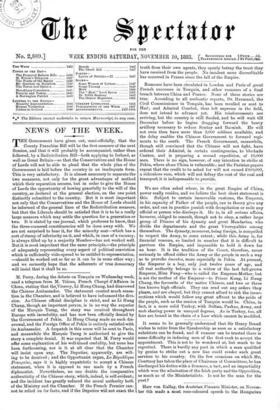We are often asked where, in the great Empire of
China, power really resides, and we believe the best short statement is this. Subject to certain immovable customs, the Emperor, in his capacity of Father of the people, can in theory give any order, and can in practice punish with decapitation or exile any official or person who disobeys it. He is, in all serious affairs, however, obliged to consult, though not to obey, a rather large group of Princes of his dynasty and great Mandarins, who divide the departments and the great Viceroyalties among themselves. The dynasty, moreover, being foreign, is compelled to respect the Army, to some extent ; while this Army is, for financial reasons, so limited in number that it is difficult to garrison the Empire, and impossible to hold it down for an hour. It is the tradition of the Court, therefore, never seriously to offend either the Army or the people in such a way as to provoke &mutes, more especially in Pekin. At present, the Emperor is a boy, only just twelve years of age, and all real authority belongs to a widow of the last full-grown Emperor, Hien Fang—who is called the Empress-Mother, but is not the mother of the Emperor—to Prince Rung, Li Hung Chang, the favourite of the native Chinese, and two or three less known high officials. They can send out any orders they please, and are obeyed, but they cannot afford to risk the insur- rections which would follow any great affront to the pride of the people, such as the cession of Tonquin would be. China, in fact, is a more solid Turkey, with Sultan, Pashas, Army, and mob sharing power in unequal degrees. As in Turkey, too, all four are bound in the chain of a Law which cannot be modified.


































